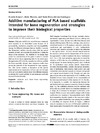Identificador persistente para citar o vincular este elemento:
https://accedacris.ulpgc.es/jspui/handle/10553/75212
| Campo DC | Valor | idioma |
|---|---|---|
| dc.contributor.author | Donate, Ricardo | - |
| dc.contributor.author | Monzón, Mario | - |
| dc.contributor.author | Alemán Domínguez, María Elena | - |
| dc.date.accessioned | 2020-11-04T18:43:35Z | - |
| dc.date.available | 2020-11-04T18:43:35Z | - |
| dc.date.issued | 2020 | - |
| dc.identifier.issn | 1618-7229 | - |
| dc.identifier.other | Scopus | - |
| dc.identifier.uri | https://accedacris.ulpgc.es/handle/10553/75212 | - |
| dc.description.abstract | Polylactic acid (PLA) is one of the most commonly used materials in the biomedical sector because of its processability, mechanical properties and biocompatibility. Among the different techniques that are feasible to process this biomaterial, additive manufacturing (AM) has gained attention recently, as it provides the possibility of tuning the design of the structures. This flexibility in the design stage allows the customization of the parts in order to optimize their use in the tissue engineering field. In the recent years, the application of PLA for the manufacture of bone scaffolds has been especially relevant, since numerous studies have proven the potential of this biomaterial for bone regeneration. This review contains a description of the specific requirements in the regeneration of bone and how the state of the art have tried to address them with different strategies to develop PLA-based scaffolds by AM techniques and with improved biofunctionality. | - |
| dc.language | eng | - |
| dc.relation | Mejora de la Biofuncionalidad de Scaffolds Polimericos Obtenidos Por Fabricacion Aditiva | - |
| dc.relation.ispartof | E-Polymers | - |
| dc.source | e-Polymers [ISSN 1618-7229], v. 20 (1), p. 571-599, (2020) | - |
| dc.subject | 3313 Tecnología e ingeniería mecánicas | - |
| dc.subject.other | Polylactic acid | - |
| dc.subject.other | Bone tissue engineering | - |
| dc.subject.other | Composite materials | - |
| dc.title | Additive manufacturing of PLA-based scaffolds intended for bone regeneration and strategies to improve their biological properties | - |
| dc.type | info:eu-repo/semantics/article | - |
| dc.type | Article | - |
| dc.identifier.doi | 10.1515/epoly-2020-0046 | - |
| dc.identifier.scopus | 85095863859 | - |
| dc.contributor.authorscopusid | 57201736831 | - |
| dc.contributor.authorscopusid | 7003371153 | - |
| dc.contributor.authorscopusid | 56097219900 | - |
| dc.identifier.eissn | 1618-7229 | - |
| dc.description.lastpage | 599 | - |
| dc.identifier.issue | 1 | - |
| dc.description.firstpage | 571 | - |
| dc.relation.volume | 20 | - |
| dc.investigacion | Ingeniería y Arquitectura | - |
| dc.type2 | Artículo | - |
| dc.description.numberofpages | 8 | - |
| dc.utils.revision | Sí | - |
| dc.date.coverdate | Enero 2020 | - |
| dc.identifier.ulpgc | Sí | - |
| dc.contributor.buulpgc | BU-ING | - |
| dc.description.sjr | 0,386 | |
| dc.description.jcr | 2,025 | |
| dc.description.sjrq | Q2 | |
| dc.description.jcrq | Q3 | |
| dc.description.scie | SCIE | |
| item.grantfulltext | open | - |
| item.fulltext | Con texto completo | - |
| crisitem.project.principalinvestigator | Monzón Verona, Mario Domingo | - |
| crisitem.author.dept | GIR Fabricación integrada y avanzada | - |
| crisitem.author.dept | Departamento de Ingeniería de Procesos | - |
| crisitem.author.dept | GIR Fabricación integrada y avanzada | - |
| crisitem.author.dept | Departamento de Ingeniería Mecánica | - |
| crisitem.author.dept | GIR Fabricación integrada y avanzada | - |
| crisitem.author.orcid | 0000-0002-4337-5991 | - |
| crisitem.author.orcid | 0000-0003-2736-7905 | - |
| crisitem.author.orcid | 0000-0002-2254-9905 | - |
| crisitem.author.parentorg | Departamento de Ingeniería Mecánica | - |
| crisitem.author.parentorg | Departamento de Ingeniería Mecánica | - |
| crisitem.author.parentorg | Departamento de Ingeniería Mecánica | - |
| crisitem.author.fullName | Donate González, Ricardo | - |
| crisitem.author.fullName | Monzón Verona, Mario Domingo | - |
| crisitem.author.fullName | Alemán Domínguez, María Elena | - |
| Colección: | Artículos | |
Citas SCOPUSTM
125
actualizado el 08-jun-2025
Citas de WEB OF SCIENCETM
Citations
102
actualizado el 08-jun-2025
Visitas
211
actualizado el 31-may-2025
Descargas
177
actualizado el 31-may-2025
Google ScholarTM
Verifica
Altmetric
Comparte
Exporta metadatos
Los elementos en ULPGC accedaCRIS están protegidos por derechos de autor con todos los derechos reservados, a menos que se indique lo contrario.
